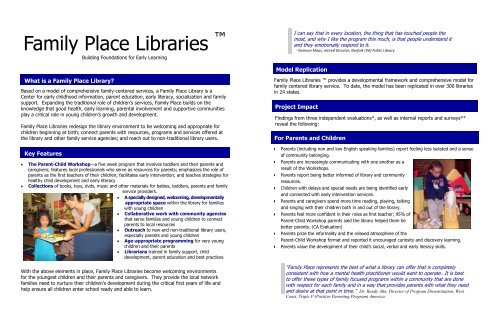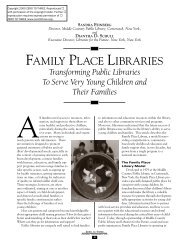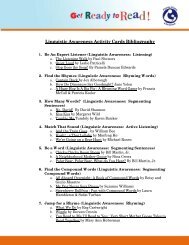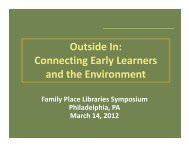Family Place Libraries ™
Family Place Libraries ™
Family Place Libraries ™
You also want an ePaper? Increase the reach of your titles
YUMPU automatically turns print PDFs into web optimized ePapers that Google loves.
<strong>Family</strong> <strong>Place</strong> <strong>Libraries</strong> Building Foundations for Early LearningI can say that in every location, the thing that has touched people themost, and why I like the program this much, is that people understand itand they emotionally respond to it.- Norman Maas, retired Director, Norfolk (VA) Public LibraryModel ReplicationWhat is a <strong>Family</strong> <strong>Place</strong> Library?Based on a model of comprehensive family-centered services, a <strong>Family</strong> <strong>Place</strong> Library is aCenter for early childhood information, parent education, early literacy, socialization and familysupport. Expanding the traditional role of children’s services, <strong>Family</strong> <strong>Place</strong> builds on theknowledge that good health, early learning, parental involvement and supportive communitiesplay a critical role in young children’s growth and development.<strong>Family</strong> <strong>Place</strong> <strong>Libraries</strong> redesign the library environment to be welcoming and appropriate forchildren beginning at birth; connect parents with resources, programs and services offered atthe library and other family service agencies; and reach out to non-traditional library users.Key FeaturesThe Parent-Child Workshop—a five week program that involves toddlers and their parents andcaregivers; features local professionals who serve as resources for parents; emphasizes the role ofparents as the first teachers of their children; facilitates early intervention; and teaches strategies forhealthy child development and early literacyCollections of books, toys, dvds, music and other materials for babies, toddlers, parents and familyservice providers.A specially designed, welcoming, developmentallyappropriate space within the library for familieswith young childrenCollaborative work with community agenciesthat serve families and young children to connectparents to local resourcesOutreach to new and non-traditional library users,especially parents and young childrenAge-appropriate programming for very youngchildren and their parentsLibrarians trained in family support, childdevelopment, parent education and best practicesWith the above elements in place, <strong>Family</strong> <strong>Place</strong> <strong>Libraries</strong> become welcoming environmentsfor the youngest children and their parents and caregivers. They provide the local networkfamilies need to nurture their children’s development during the critical first years of life andhelp ensure all children enter school ready and able to learn.<strong>Family</strong> <strong>Place</strong> <strong>Libraries</strong> provides a developmental framework and comprehensive model forfamily centered library service. To date, the model has been replicated in over 300 librariesin 24 states.Project ImpactFindings from three independent evaluations*, as well as internal reports and surveys**reveal the following:For Parents and ChildrenParents (including non and low English speaking families) report feeling less isolated and a senseof community belonging.Parents are increasingly communicating with one another as aresult of the Workshops.Parents report being better informed of library and communityresources.Children with delays and special needs are being identified earlyand connected with early intervention services.Parents and caregivers spend more time reading, playing, talkingand singing with their children both in and out of the library.Parents feel more confident in their roles as first teacher; 95% ofParent-Child Workshop parents said the library helped them bebetter parents. (CA Evaluation)Parents prize the informality and the relaxed atmosphere of theParent-Child Workshop format and reported it encouraged curiosity and discovery learning.Parents value the development of their child’s social, verbal and early literacy skills.“<strong>Family</strong> <strong>Place</strong> represents the best of what a library can offer that is completelyconsistent with how a mental health practitioner would want to operate…It is bestto offer these types of family focused programs within a community that are donewith respect for each family and in a way that provides parents with what they needand desire at that point in time.” Dr. Randy Ahn, Director of Program Dissemination, WestCoast, Triple P (Positive Parenting Program) America.
For <strong>Libraries</strong>100% of library administrators credit<strong>Family</strong> <strong>Place</strong> with having a positiveimpact on library staff, parents/caregivers, young children and thelibrary as an institution. (LI InterimReport)100% of libraries redesigned spaceand collections for very youngchildren, parents, caregivers andfamily serving professionals. (NationalSurvey)<strong>Family</strong> <strong>Place</strong> <strong>Libraries</strong> Building Foundations for Early Learning97% indicate the library has become acommunity destination for familieswith very young children. (LI InterimReport)95% of <strong>Family</strong> <strong>Place</strong> <strong>Libraries</strong> report partnering with community agencies serving families withyoung children. (National Survey)83% of CA libraries reported adapting new family policies and practices and 75% reportedintegrating services for families into their overall mission and service plans. (CA Evaluation)82% of libraries indicated previous non library users now participate in programs and/or takeadvantage of library services for young children and parents. (LI Interim Report)74% see an increase in number of parents/caregivers using a wide array of library resources inaddition to <strong>Family</strong> <strong>Place</strong>. (LI Interim Report)Over 72% offer the Parent-Child Workshop series two or more times per year; with 16% offering it3 or more times per year. 12% of the respondents were new sites currently developing theworkshop. (National Survey)63% have renovated or expanded their Children’s space and another 5% have plans to do so.(National Survey)Overview and Impact SummaryPublic libraries who have been able to implement <strong>Family</strong> <strong>Place</strong> through the CaliforniaState Library grants have transformed their services to families with young children. Inthe process, they have been able to establish the library as a key player in the world ofearly childhood service providers. Dr. Virginia Walter, Ph.D. UCLA Graduate School ofEducation and Information Studies & Evaluator of CSL <strong>Family</strong> <strong>Place</strong> GrantsMiddle Country Public Library101 Eastwood Blvd.Centereach, NY 11720631.585.9393www.familyplacelibraries.org*California <strong>Family</strong> <strong>Place</strong> <strong>Libraries</strong> 2010-11 Evaluation Report; <strong>Family</strong> <strong>Place</strong> Long Island 2011 Interim Report, and <strong>Family</strong> <strong>Place</strong> LogicModel Focus Group Report of Parents and Caregivers for Five Blair County (PA) <strong>Libraries</strong>, 2006**<strong>Family</strong> <strong>Place</strong> <strong>Libraries</strong> National Survey 2013





